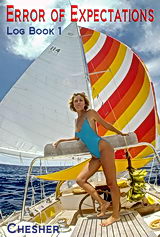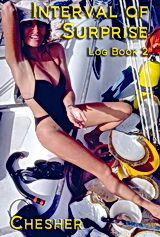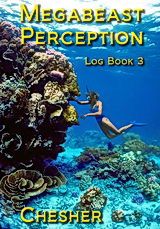PLANNED FAILURE
Neil Stanton, the Provincial Fisheries Officer, meets us at the small wooden dock of the Provincial Fisheries Center. He's lived in PNG most of his life and is an astute, charming man.
Neil shows us around the Fisheries Center he's built. Young local boys, ranging from 14 to about 20, are busy with various projects.
His trainees build boats, learn how to fix engines, how to fish, clean and care for the fish products, and how to get along in a friendly way with each other.
Neil keeps them in line and somehow manages to do it in a way that keeps them happy.
Neil yells at one of the boys in the local language. The boy looks frightened
and runs off to do whatever Neil said. "They appreciate discipline," Neil says
with a half-smile. He shows us their smoke curing facility where they smoke beche-de-mer
and giant clam meat for export.
"Giant clam meat? Yeah. I heard you guys got quite a haul down in Sudest." I look over the sweet-smoke filled interior of the wood shack. The only thing drying is a set of tiger shark jaws easily big enough to pass over my body without touching me.
"Those guys were supposed to be tuna fishing," Neil groans. "They came back with all that clam meat, so we thought we'd smoke it and try a big cash export. But they let the bloody fire go out and the whole lot got fungus. We tossed it all away."
I look at Neil and begin to seethe. "Your boys killed all those big clams, in a taboo area, and they just got tossed out?"
"Well, the pigs ate them. There are plenty more out there." Neil ignores, or does not care, that I am fuming. "Anyway, we never expected this place to be commercially profitable. Hell, New Zealand tinned fish is cheaper in Burns Philip than we can ever produce it for here."
There is no point in making a stink about the giant clams until we actually do our survey and show what the population is. Or isn't.
"You're right," we follow him on to the boat building shed. "In addition to low density and high diversity making coral reef products costly to get, there is the problem of phosphate."
Neil looks at me, curious, "What about phosphate?"
"Coral reefs are phosphate sinks - they capture phosphates from the sea and from terrestrial run-off. In the tropical sea, the only phosphate available is bound up in living tissue. Living tissue doesn't need much, but there is so little available in tropical sea water it is THE limiting factor. Biologically, everything on the reef depends on phosphate."
"No kidding? Hey, get your ass moving!" He shouts to a boy who is snoozing under a half-built boat. "They build their own boat and then get to fish it," Neil looks over the work as the boy begins shaping a piece of wood. "So what does phosphate have to do with our operation?"
"Everything. Plankton eating fish play a vital role in the Reef community's phosphate cycle. They capture tiny animals from the sea like a big mobile net - with individual fish as the knots in the net.
"The waste from the fish, rich in phosphate and nitrate, drops down onto the reef. Corals eat the pellets of waste and use the phosphate to fertilize their algae.
Sea Birds cast an aerial net hundreds of miles over the sea. They return to the reef islands at night and when they drop their wastes, it forms Guano, one of the world's most important sources of fertilizer. Some of this phosphate meters into the sea with each rain and the corals and algae of the reef capture it.
"The herbivorous and carnivorous reef fish and other animals get their phosphate and their habitat from the algae and living corals. And your boys catch the fish and other animals."
"That's really very interesting, Richard. But what's the practical application?" Neil looks at me expectantly.
"Simply this. If you overfish a reef, you remove the plankton net. If you kill the sea birds, or chase them away, you remove the aerial phosphate trap. Intensive fishing removes the reserve phosphates tied up in the bulk of reef fish and other animals. Do this, and the reef finds itself phosphate starved and without means to replenish the phosphate."
"And it stops growing?" Neil asks as we resume walking back towards the dock.
"Right. You cause a long term, maybe irreversible break-down in the whole cycle.
Commercial exploitation of tropical coral reefs inevitably results in the destruction of the habitat."
"Like farming the soil too hard can destroy it forever," Neil frowns.
"Exactly. Just like timbering a tropical island will ruin it's soil and its water cycle."
"Aww, we're hardly touching the reefs around here. Come on, Richard, think of the reefs between here and Sudest." Neil laughs.
"How's the fishing here in this bay?" I ask.
"Well, that's different, the boys hit this area pretty good for lunch food."
"Right. For lunch. And there are villages scattered everywhere throughout these islands. Maybe your boys are not hitting those reefs, but the subsistence fishermen are. I'm not saying your boys are a danger to the reefs. What I'm saying is the local people probably fish the reefs close to the limit. I don't think there is an export reserve here to feed the highlands or the rest of the world. Even if there was, you could never, as you say, compete economically with the high latitude fisheries who sweep up tons of fish in a single trawl haul."
"Listen, I have to get back to it here. You going shopping today?"
"Right." Freddy is already in the Avon, ready to leave for Samarai. Two young boys are pulling a big tiger shark up to the wharf.
"Why not stop by my island on the way home this evening and continue our chat?" Neil points to Eboma, a little island just northwest of Samarai.
"Sounds great. Where did they catch Mr. Monster?" I ask, pointing to the nearly dead shark.
"Just around the corner here. China Straits is crawling with them. Want to buy some teeth?" Freddy is frowning at the shark, no doubt thinking of my diving alone in the middle of China Straits.
The wharf at Samarai is lined with island boats and canoes. "Ho ho, looks like it's a bustling little town, today," I say as we tie up. Today is Friday - market day. Freddy and I walk down streets crowded with brightly dressed people. In the market area, vendors sit on coconut mats with little piles of baby tomatoes, green onions, cabbage, papayas, and pineapples. I find some of the delicious mountain cat-tails. When green, they are so succulent it is unbelievable. Freddy steams them and serves them with butter. They taste just like baby corn.
Smoked octopus hang like parchment kites in the gentle wind and children race
in and out of the milling people. A big crowd has gathered to listen to an evangelist. The
guy is good, he's got the people singing hymns. He gets so enthusiastic he leaps up into
the air with the upbeats. I lose sight of Freddy. No matter.
I amble up the main street and meet the manager of Steamships Trading store. He is a short little guy with a hunch back. We open negotiations on an outboard swap. I want a smaller one he wants a bigger one. We have a three year old 35 hp Evenrude, he had a brand new 15 hp Evenrude. He bought it for his wooden fishing boat but it is simply not strong enough.
About five, I show up at the Avon. Freddy is sitting amid heaps of groceries. She has a miserable look on her face. "What's wrong?" I ask.
"Where were you when I needed you?" She complains.
"Uh, here and there. Mostly with the guy from
Steamships. I helped him out with a little project replanting some trees. He wants to swap
outboards. Then I had to get fuel. So what happened?"
"There was a little boy at the market who came up to me with the biggest pearl I've ever seen. He wanted anything for it. I didn't have a watch on. I didn't have any more money. I couldn't find you. It was TERRIBLE."
"Well where is he? Let's go find him." I look around expecting to find the kid standing there, pearl in hand.
"I don't know. I lost him looking for you." Freddy mopes.
We motor out to Neil's island for sunset drinks. Neil's island is isolated, tiny, cute, tropical, and his house is big. "One of the left over delights of the colonial days," Neil says as we sit down on the veranda, overlooking China Straits. Neil has put out a tray with cold beer and glasses. He passes them around and puts his big bare feet up on the rail. "So, tell me what you think about National Fisheries and their Coastal Development Program," he closes his eyes and takes a long, cool slurp of his beer.
"That's dangerous," Freddy shoots back.
Neil looks at her, "What?"
"It's always dangerous to ask him what he thinks about anything unless you want an hour lecture." she smiles.
"Hey!" I protest.
Neil chuckles and gestures for me to go ahead, "Lecture on Professor."
"Well, OK. First, I think your provincial fisheries operation here is terrific. You're working on a grass-roots level, helping the youth, building the fisheries industry into the whole community. Quite frankly, I admire what you have accomplished. It would seem, to me, the best approach for development of fisheries in PNG would be to have people like you, people who are attuned to the community on the real-world level, act as the leaders in long term development. The National team should provide back up, as needed, to support your projects and integrate and coordinate regional projects between sectors." Neil starts to say something but I am just starting.
"This is, I realize, dimly conceived of in theory by the existing government. But it is not carried out in practice for two reasons. First, the productive, sensitive agents - such as yourself - are on the bottom, not the top, of the chain of command. Second, the money comes from exterior aid agencies and is tied to big money development projects. It is administratively easier for the U.N. or the World Bank to give a big sum, like $7 million dollars, to pay for an integrated construction-type project, than to try and put together fifty or sixty little projects of local interest.
"The aid agencies are constrained by their own national political scene and by economics. It makes sense for them to give funds for industrial or building projects because their own countries will supply the equipment and materials to do the work so the money is actually recycled. It also makes sense to give funds for projects resulting in the export (to the donor countries) of natural resources.
"The PNG government likes big money projects - especially for industrial or building activities. If the money is for building freezer plants and tuna canneries, there is ample opportunity for powerful individuals to get financially involved. If you get my meaning. In the end, recycling money is more important to the National Government and to the Aid agency than the actual business of developing a socially and ecologically sound way of life. This is true in all areas of development, including the fisheries industry."
I take a sip of beer. "Ultimately, the Director and the aid donors believe the multi-million dollar freezer/cannery project will work because of the unlimited fisheries resources out there. But I don't think the resources exist. I don't think the reefs will support large scale commercial fisheries and so the project depends on an unknown pelagic fish resource - especially tuna. But nobody knows what is actually out there. Also, freezers and canneries only get filled up by tuna if there are hi-tech tuna boats manned by fishermen who know what they are doing, and backed up by support facilities to keep the ships working. And foreign tuna boats won't stop at coastal freezer plants, they head for major canneries.
"The project can fail from a thousand directions, including deliberate sabotage by people who would rather leech off the funds than let them be used for real construction. Since the money must be filtered through the Government Finance Office, only a small proportion will ever trickle down to actually pay for real construction. Almost nothing will seep out to help guys like you develop the backbone of the industry.
"Maybe the fish stocks are not there or maybe they are highly seasonal. Maybe the people won't work in the canneries. Maybe local fishermen don't want to work hard for months at a time. Maybe the cost of getting back up supplies and materials to the outer islands will turn out to be just too expensive for the canneries to compete with Asian, Fijian or American Samoan canneries. The local fishermen will be outraged if the canneries try to buy local-caught tuna from licensed foreign fishing boats. Mostly because the local fishermen will believe (correctly) the foreign boats are taking food from their families.
"PNG is one of the most politically complicated countries in the Pacific. This is bound to result in a real bash-em-up when, and if, National Fisheries tries to get the dollars from the Capital into one of the Provinces." I slow down and then stop. I've already talked too much.
"Wow. I wish I had taped that," Neil catches my startled look. "No, I mean just for myself, I'd like to listen to it again. It's what I feel every time I go up to visit them. Have you talked to Peter about this?"
"Some. He's hard to talk to about most of it. He's going to make it work and that's that."
"Yeah, I know exactly what you mean. Care for another beer?" Neil gets up.
"It's going to get dark before we get home," Freddy warns.
"Right," I get up to go.
"What next?" Neil asks as we walk down to the wharf.
"I've got some things to do here and then, maybe next month, we'll be off to the Trobriand Islands, to survey some more pearl oysters," Freddy and I get into the Avon.
"Stop by the office tomorrow, I'll give you some information on anchorages and I'll fill you in on what I know about the place. Give you some people to contact." Neil stands on the wharf as we start the engine and head off for Belasona and the Moira.



